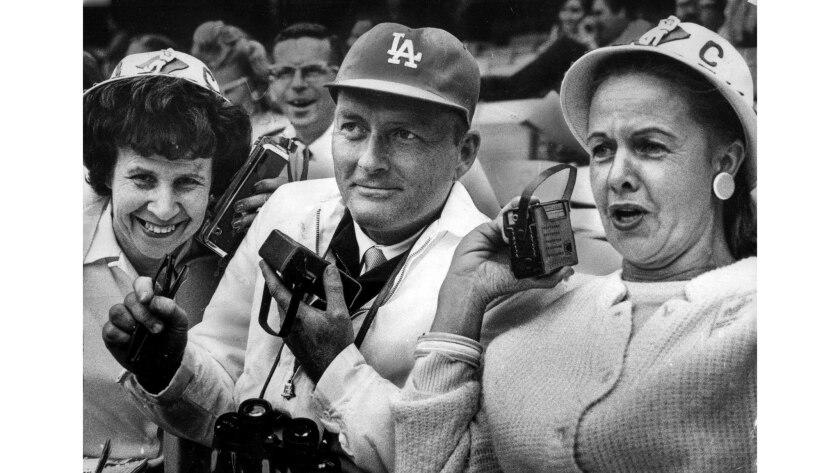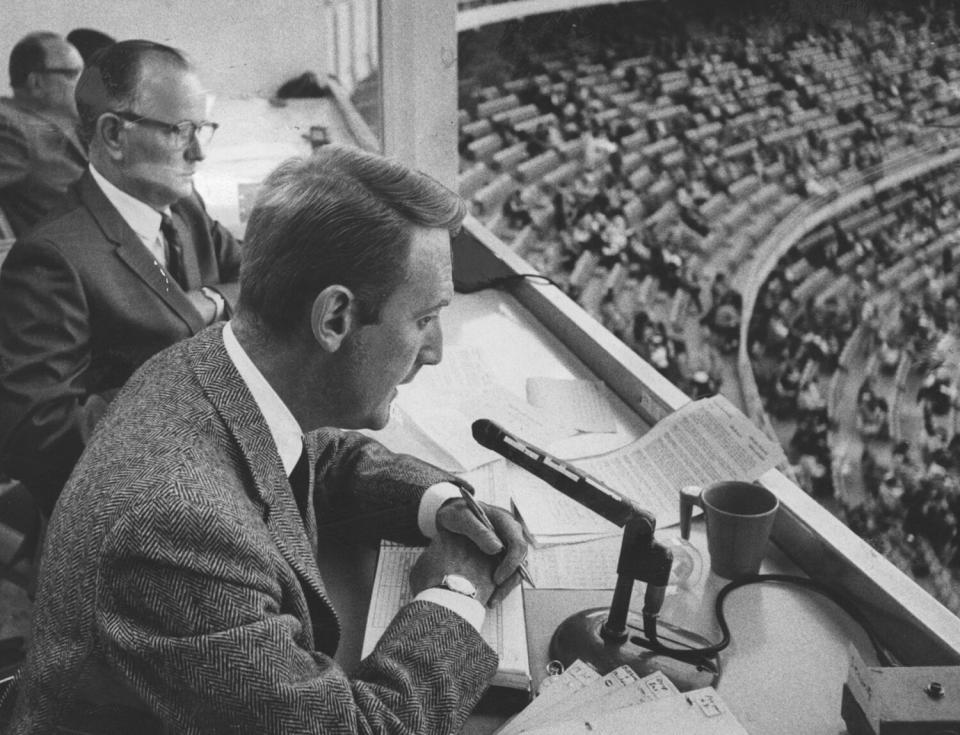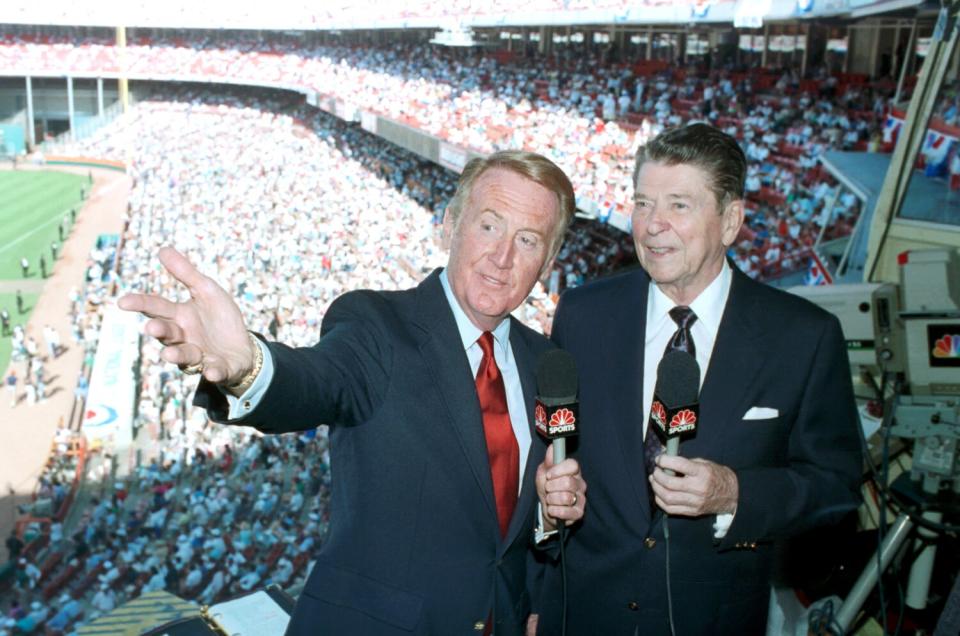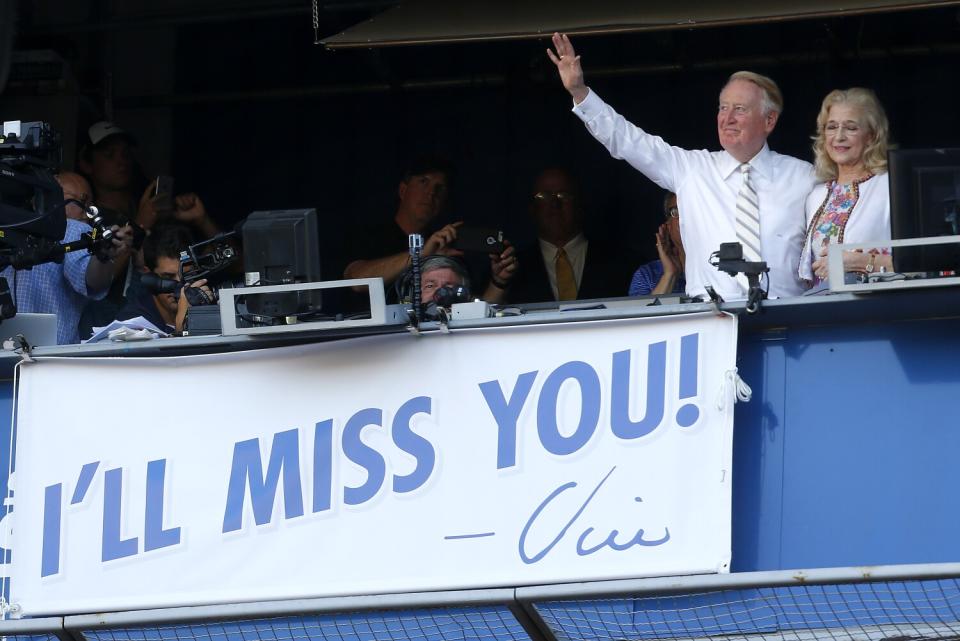Vin Scully, Dodgers fans and the transistor radio: How an unbreakable bond was formed

Today, you can walk into Dodger Stadium, device in hand. The device lets you make phone calls, send text messages, take photos, access statistics and replays, post your thoughts on social media, play games, and buy food, drinks and souvenirs.
When Dodger Stadium opened in 1962, you could walk into the stadium, device in hand. That device let you do exactly one thing: listen to the radio.
That is what everyone did, for decades, in the greatest communal experience in Southern California sports history: tens of thousands of fans, assembled in one place, listening on a tiny radio as the greatest broadcaster in baseball history described the game being played right in front of them.
In 2016, when Vin Scully bid farewell to Dodgers fans before his final home game, this is how he put it: “The transistor radio is what bound us together.”
The transistor radio went mainstream at about the same time the Dodgers arrived in Los Angeles in 1958, timing so fortuitous that Scully called it “one of the biggest breaks” the team and its broadcasters could get.
For their first four seasons in Los Angeles, the Dodgers played in the cavernous Coliseum, with some fans so far removed from the action they needed Scully to let them know what was happening. You might have been sitting high above one end zone, with home plate near the other end zone.
And, although locals had enjoyed the Los Angeles Angels and Hollywood Stars in the Pacific Coast League, the Dodgers brought the major leagues to Southland fans.
“They knew about Willie Mays and Stan Musial, but they didn’t know the rank-and-file players,” Scully told his social media audience two years ago.
The Dodgers, brought to you by Scully.
“It was Vinny who introduced the Dodger organization to Southern California, to Los Angeles,” former owner Peter O’Malley said.

“It wasn’t the first baseman, or the manager, or the team — certainly not with the won and lost record, because they had a tough year. It was Vinny who introduced the team. There was no one who could have done it better. When you pause to understand the impact that he had then, as well as today, it’s extraordinary.”
For Los Angeles, for so long a city of transplants, Scully was a perfect fit.
“With Vinny, it didn’t make any difference whether you were a Dodger fan, or you came from the Midwest and you were a Cincinnati Reds fan,” said Fred Claire, the Dodgers’ former general manager and publicist. When the Dodgers landed in Southern California, Claire was a local newspaperman.
“The non-partiality of Vinny, I think, is a point that never really gets noted enough,” Claire said. “He just made everyone feel comfortable. There was never a ‘home team’ sense.”
In 1960, just for fun, Scully made a request that demonstrated his reach and power. On the broadcast one night, he asked fans at the game to await his count to three, then shout “Happy Birthday, Frank!” to umpire Frank Secory.
If fans at the game were not listening in any great numbers, Scully could have been embarrassed. Instead, Secory was startled by the loud greeting.
“That was the night I realized that, if I used it very carefully, the transistor radio could be a great bridge between me and the fans,” Scully said.

For decades, it was. You could get up from your seat to get a hot dog, but you would not miss a pitch, and not because you could pick up the game on a television monitor. So many people had a transistor radio on, it was as if Scully’s voice walked with you to the concession stand.
Claire called Scully “one of the great storytellers of all time.” In this era, broadcasters can drown fans in a tsunami of win probabilities and exit velocities.
Scully invited you to “pull up a chair.” He wanted you to have fun, and to share a story or two with you: ice skating with Jackie Robinson, the history of beards, and did you know that Uggla means owl in Swedish?
“It was more than strike two, or ball three, or base hit to left field,” O’Malley said. “It was his personality and his background and his extraordinary communication.
“He did the games alone. He didn’t need, or even want, somebody to do analysis or color commentary. He was talking to you. He wasn’t talking to the other fellow in the booth. He was talking to the person on the other end of that radio.”
In 1998, the Los Angeles Times Magazine named Scully “the most trusted man in Los Angeles.”
You had to hear him call the game, even if you were at the game, and of course if you were not. The soundtrack of a summer sunset in Southern California started with Scully wishing you “a very pleasant good evening, wherever you may be.”
Said Claire: “Vinny’s voice not only covered the stadium, it covered the beach.”
The transistor radio made it all possible, the little sound machine wrapped inside your hand or attached to a wrist strap.
On the day of his final home game, Scully asked: “Were you among the crowd that groaned at one of my puns? Or did you kindly laugh at one of my little jokes? Did I put you to sleep with the transistor radio tucked under your pillow?”
Yes, yes, and yes.
And, when the Dodgers played during the school day, we listened in class, with an earphone discreetly connected to the transistor radio in our pocket. (Sorry, Ms. Bickove.)
We will never again see this kind of relationship between a broadcaster and a fan base, at any ballpark.

In the service of the so-called “fan experience,” teams now bombard fans at the game with the sights and sounds of music, videos and advertisements, even though you might not notice because you are looking at your phone.
Teams want broadcasters to root, root, root for the home team. A solo broadcaster is as much of an anachronism as a paper ticket.
But, as the All-Star Game returns to Dodger Stadium, it is entirely fitting to note that their biggest star in Los Angeles never played an inning for the team. Walter O’Malley, the owner who moved the Dodgers here from Brooklyn, once called Scully “the greatest Dodger.”
Welcome to the 2022 All-Star Game, at the ballpark located at 1000 Vin Scully Avenue.
This story originally appeared in Los Angeles Times.

 generic
generic 